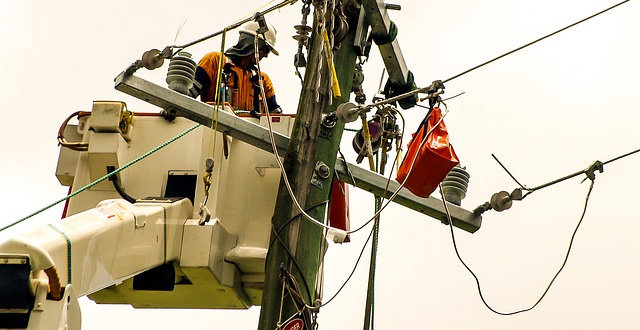Cherry picker
Contents |
[edit] Introduction
Cherry pickers are pieces of machinery easily identified by their long, extendible arm (or boom) with a cradle attached on the end. They are also known as telehandlers, telescopic handlers, and boom lifts.
Cherry pickers can be moved, and are versatile, with a boom able to extend forwards and upwards. Several different attachments can be fitted to the end of the boom, such as a cradle, bucket, pallet forks, muck grab, winch, and so on.
[edit] Uses
They are multi-purpose and flexible, ideal for any job that requires the user to work at height, in particular, in awkward locations.
[edit] Fruit picking
The name 'cherry picker' is derived from their original purpose - to help people pick cherries. It is still possible to find them being used in fruit orchards, helping to get the hard to reach fruit at the tops of trees and in difficult to reach locations.
These machines revolutionised how people could pick fruit and ensured the best fruit could always be picked in safe manner – with no danger of falling. They have also made the process of picking fruit more efficient through time savings and the reduced risk of losing fruit to falls.
Other uses of cherry pickers include:
[edit] Construction
Cherry pickers can be used to gain access to upper floors of construction works without needing to erect scaffolding or use cranes. Their mobility and flexibility means that they can give rapid access to a number of different locations.
[edit] Telegraph poles
Cherry pickers allow engineers to reach the top of telegraph poles to either inspect or repair cabling. This highly-skilled job has been made much less dangerous and complex by the use of cherry pickers. Previously, engineers had to ascend the poles a ladder, or by climbing them. Now they can reach the top in the relative safety of the cherry picker’s cradle with space for their tools and for multiple engineers.
[edit] Cleaning
Maintenance of building facades is very important, but can be difficult due to height, difficult shapes and poor access. Cherry pickers have made the process of cleaning and maintaining the more difficult-to-reach, lower parts properties easier and safer. Workers no longer need to use ladders or scaffolding whilst carrying tools, buckets and other equipment.
[edit] Fire and Rescue Service
The fire and rescue service can use cherry pickers to fight fires and save lives. They allow them to reach the higher floors of buildings and create a safe platform to step onto to reach safety.
[edit] Filming
Cherry pickers can be used for shots that require an elevated angle above a scene. Cameras can be mounted directly onto a cherry picker and remotely controlled to give sweeping aerial shots.
[edit] Related articles on Designing Buildings
- Back actor.
- Bituminous mixing and laying plant.
- CDM.
- Compressed air plant.
- Concreting plant.
- Crane regulations.
- Construction plant.
- Construction tools.
- Crane supports.
- Earth-moving plant.
- Excavating plant.
- Forklift truck.
- Lift table.
- Lifting device.
- Mobile elevating work platforms (MEWPs).
- Pallet jack.
- Power float.
- Scaffolding.
- Scissor lift.
- Stacker.
- Temporary works.
- Types of crane.
- Work at height regulations.
Featured articles and news
CIOB and CORBON combine forces
To elevate professional standards in Nigeria’s construction industry.
Amendment to the GB Energy Bill welcomed by ECA
Move prevents nationally-owned energy company from investing in solar panels produced by modern slavery.
Gregor Harvie argues that AI is state-sanctioned theft of IP.
Heat pumps, vehicle chargers and heating appliances must be sold with smart functionality.
Experimental AI housing target help for councils
Experimental AI could help councils meet housing targets by digitising records.
New-style degrees set for reformed ARB accreditation
Following the ARB Tomorrow's Architects competency outcomes for Architects.
BSRIA Occupant Wellbeing survey BOW
Occupant satisfaction and wellbeing tool inc. physical environment, indoor facilities, functionality and accessibility.
Preserving, waterproofing and decorating buildings.
Many resources for visitors aswell as new features for members.
Using technology to empower communities
The Community data platform; capturing the DNA of a place and fostering participation, for better design.
Heat pump and wind turbine sound calculations for PDRs
MCS publish updated sound calculation standards for permitted development installations.
Homes England creates largest housing-led site in the North
Successful, 34 hectare land acquisition with the residential allocation now completed.
Scottish apprenticeship training proposals
General support although better accountability and transparency is sought.
The history of building regulations
A story of belated action in response to crisis.
Moisture, fire safety and emerging trends in living walls
How wet is your wall?
Current policy explained and newly published consultation by the UK and Welsh Governments.
British architecture 1919–39. Book review.
Conservation of listed prefabs in Moseley.
Energy industry calls for urgent reform.



























Comments